ERP development is a very efficient option for firms looking to plan and manage processes and resources accurately in the digital age. This cutting-edge technology offers a single platform for effectively managing several domains, including supply chains, economics, and human resources. Come along as we examine the foundation of ERP development, the advantages it offers companies, and the steps involved in putting ERP software into practice. Let’s start with comprehending the fundamentals of developing ERP software.
What is ERP software development?
ERP Development is a term for the process of creating ERP software. So, what is ERP?
ERP (Enterprise Resource Planning) is designed to centrally manage all business activities by collecting, storing, and managing information data from various business departments.
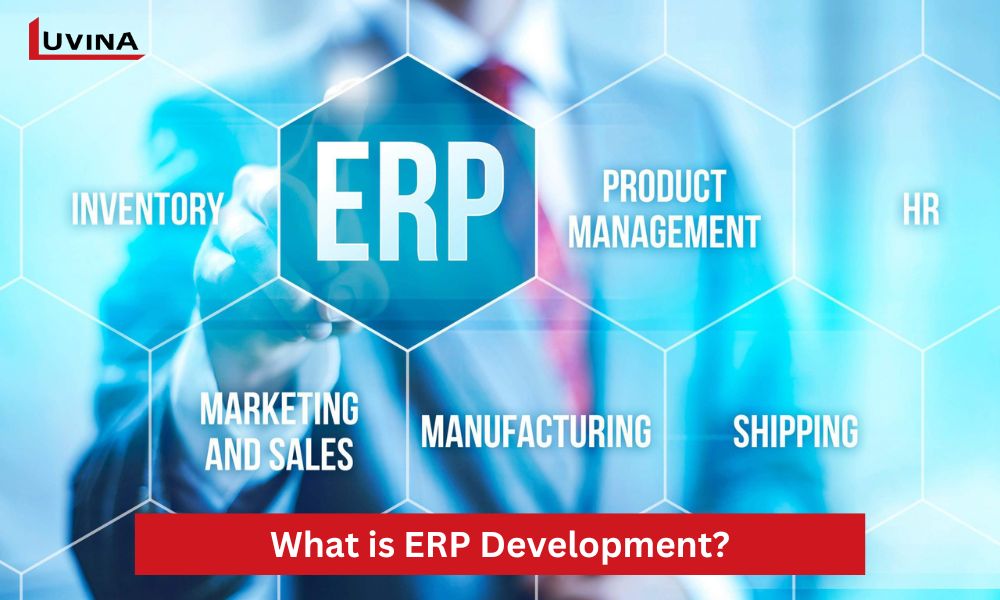
The ERP system development helps improve business efficiency by creating a centralized data storage system. The benefits of ERP development for businesses include enhanced operational efficiency and improved data management, leading to better decision-making. Research has shown that the development of ERP can reduce administrative costs by up to 22%.
ERP software can be customized to meet the specific needs of each business or organization. Companies can choose from existing solutions or select different features based on their requirements.
Currently, ERP development is a prominent technology trend, especially in the context of startups and technology companies. These businesses are focusing on improving operational efficiency and aiming for transparent business processes.
Types of ERP System
In ERP development, systems come in various types, each compatible with different deployment models. Among them, the 4 most popular types are On-premise ERP, Cloud-based ERP, Hybrid ERP, and Open-source ERP.
- On-premise ERP: This is a licensed system that is customized, upgraded, and backed up for data recovery. All processes are maintained in-house by the company’s IT staff, on the company’s servers and infrastructure.
- Cloud-based ERP: This system is also referred to as SaaS. It’s a system where all processes take place over the Internet, accessible from anywhere and at any time as long as there is an Internet connection.
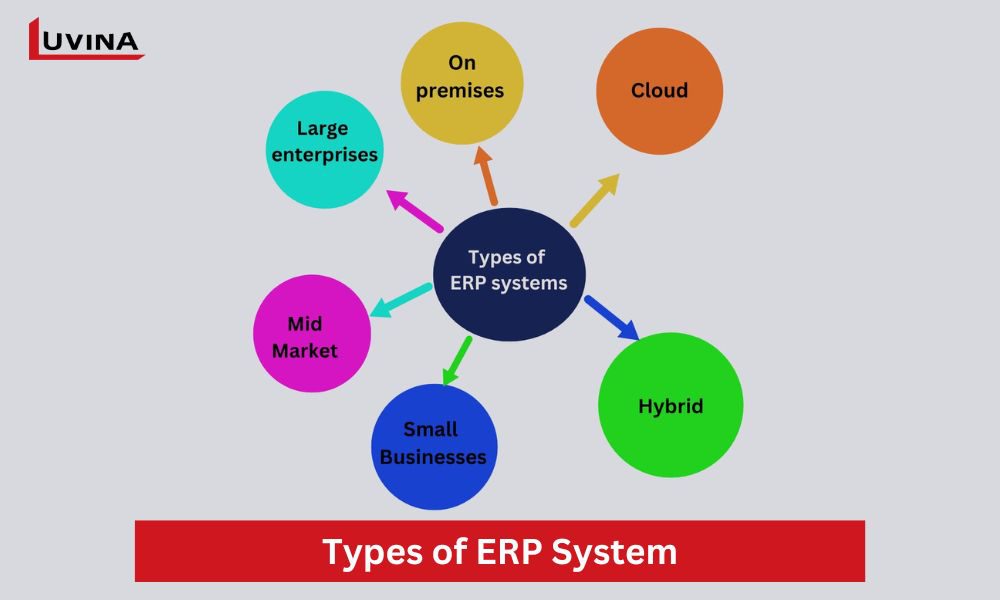
- Hybrid ERP: This system is considered a combination of On-premise ERP and Cloud ERP. The entire system, including applications and components like computing, networking, and storage, is deployed on both private and public clouds. In this setup, on-premise servers are also referred to as private clouds.
- Open-source ERP: This is an ERP system with available open-source code. Instead of relying on vendors, companies access the freely available open-source code and customize the software according to their needs.
ERP Benefits and Drawbacks
ERP development is not easy. However, if successful, this approach can bring significant benefits to businesses, such as:
- Creating isolated modules: ERP development helps you create different modules tailored to the characteristics of each department in the company. This ensures that employees in different departments won’t get confused with features and information.
- Ease of learning: Developers provide suitable documentation for training employees to use ERP, making the learning process faster.
- Improving workflow efficiency: All information about the company’s activities is organized logically, clearly, and regularly updated for employees. This enhances communication and collaboration between departments, reducing costs associated with manual work.
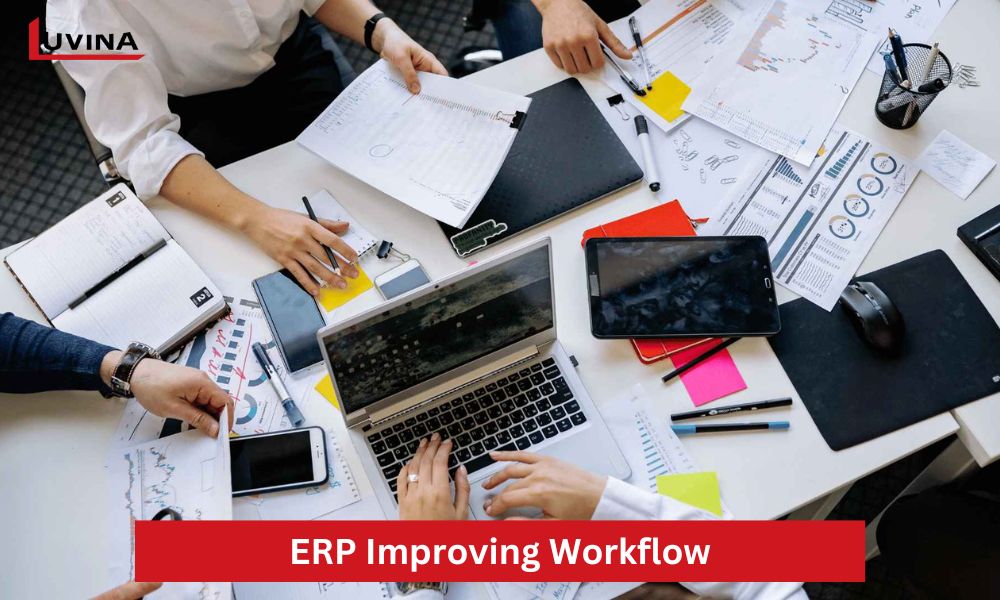
- Easy maintenance: Each ERP system has its characteristics. Once the system’s features are understood, maintenance becomes easy and quick.
- Flexibility: Compared to using third-party software, ERP system development provides a product designed specifically for your business, addressing its unique challenges.
- High security and integrity: Business owners can control data access rights. the development of ERP establishes a centralized system with high security, avoiding conflicts between sources.
ERP development brings many benefits to businesses. However, this approach still has some drawbacks, such as:
- Cost: This is one of the reasons why many businesses hesitate about ERP development. Developing software for an entire company will undoubtedly incur significant costs. However, in the long run, the flexibility and convenience of ERP software can significantly reduce operational costs. Therefore, whether ERP development is truly expensive remains a debated issue.
>> Also read: How Much Does Custom ERP Software Development Cost?
- Time-consuming: Not only does ERP development require costs, but it also takes a considerable amount of time. Besides the time for software design and testing, businesses need time to train employees on using ERP and familiarize them with the software.
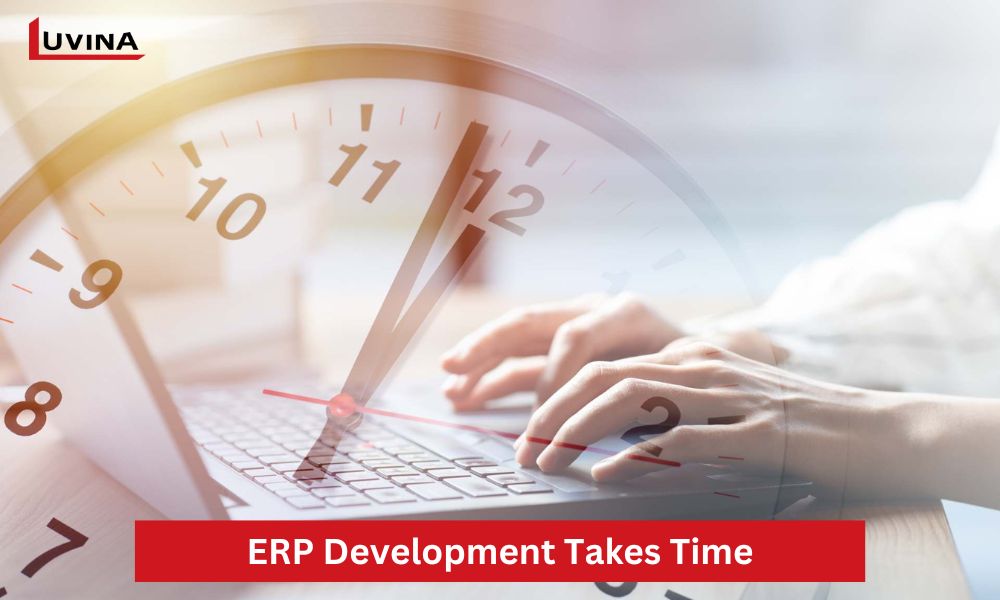
- Difficulty finding technology partners: Having a quality technology partner with experience in ERP development can bring significant business benefits. However, finding a reputable ERP software development partner takes a lot of time and sometimes even money.
Industries That Need ERP Development Software
Since the 1990s, ERP has been developed to manage human resources and accounting in the manufacturing industry. Nowadays, ERP software is increasingly widely used and has begun to be applied in various other industries such as retail, finance, education, and more.
- Manufacturing: ERP development assists in managing complex processes in the manufacturing industry, such as inventory management, production scheduling, tracking raw materials, and quality control.
- Retail: Order tracking, payment processing, and inventory management are all done by ERP systems.
- Automotive Industry: Supply chain management, project monitoring, design, and other functions are facilitated by the development of ERP in this sector.
- Food and Beverage: To fulfill client demands for consistent quality in the manufacture of drinks and food processing, the FnB business must establish an ERP.
- Education: Developing an ERP is highly beneficial for administrative management in the education sector. The ERP system will assist educational organizations in better financial management (account control, payment processing).
- Tourism and Hospitality: ERP helps hotels with scheduling cleaning, monitoring staff, managing appointments, and tracking recruitment activities.
- Healthcare: In the healthcare sector, an ERP system will aid with the management of medical supplies, appointment scheduling, and patient data.
>> Also read: 9 Top Healthcare ERP Systems You Need to Know
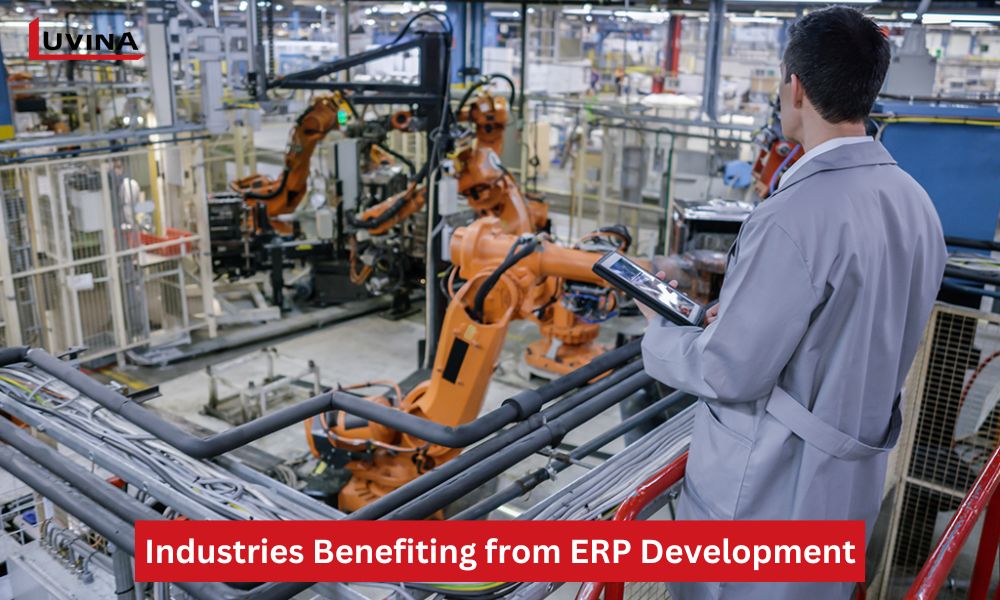
ERP System Modules
ERP development is a complex process that requires careful implementation. An ERP system can only operate effectively when it includes some essential modules, such as:
- Financial Management: This is a crucial module ensuring efficient and accurate financial processes. This module should include features such as financial reporting, ledgers, tax calculation, budgeting, etc.
- Inventory Management Module: Inventory management directly impacts a business’s profitability. Therefore, ERP development cannot overlook this module.
- Customer Relationship Management (CRM) Module: This module helps businesses effectively manage customer relationships. It should include features that improve communication between customers and the business, understand customer needs for personalized services, and track potential customers.
- Human Resource Management (HRM): This module allows businesses to manage employees more efficiently, including features like employee management, payroll processing, time tracking, etc.
- Supply Chain Management: In addition to inventory management, ERP software development also needs an SCM module to handle order management and maintain relationships with suppliers.
- Business Intelligence (BI) and Reporting: In ERP system development, this module helps businesses gain a deeper understanding of operations through reporting on sales, financial performance, inventory efficiency, etc. This allows business owners to make informed decisions.
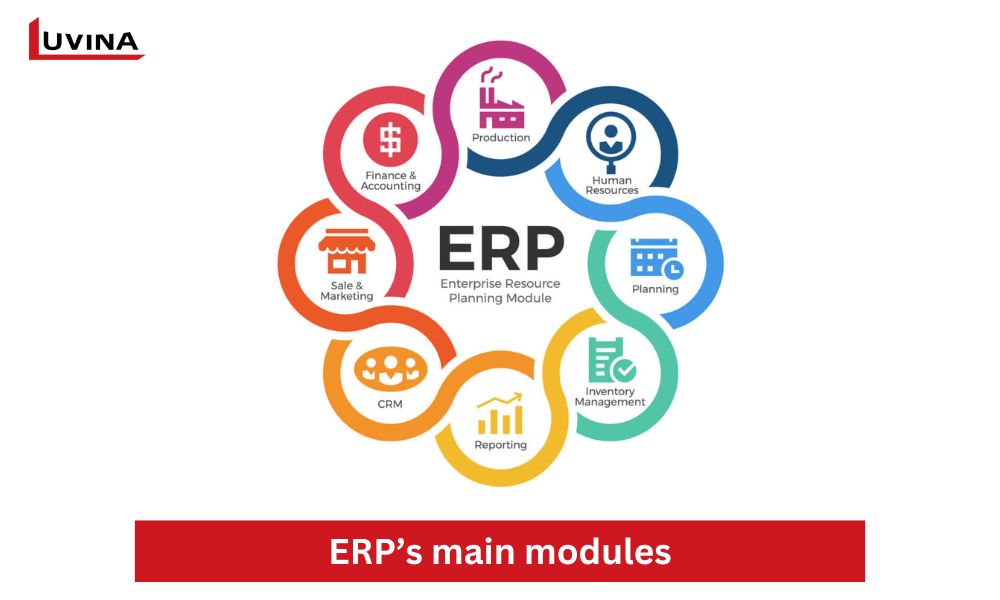
- Integration Module: ERP development requires this module to integrate the system with other software, enhancing functionality and benefits.
- Mobile Access: With this feature, company employees can access the ERP system from any internet-connected device anytime, anywhere. This not only improves work efficiency but also provides a significant competitive advantage in the business market.
Top Enterprise Resource Planning platforms
In the current market, there are hundreds of ERP platforms for businesses to choose from. Among them, the following six platforms are evaluated as being capable of operating strongly in various industries:
1. Microsoft Dynamics 365
Microsoft Dynamics is one of the prominent ERP development platforms. This platform integrates powerful CRM tools and operational tools, helping companies manage processes end-to-end and enhance connectivity between business operations. Notably, Microsoft Dynamics is praised for its AI integration, reducing errors from manual tasks.
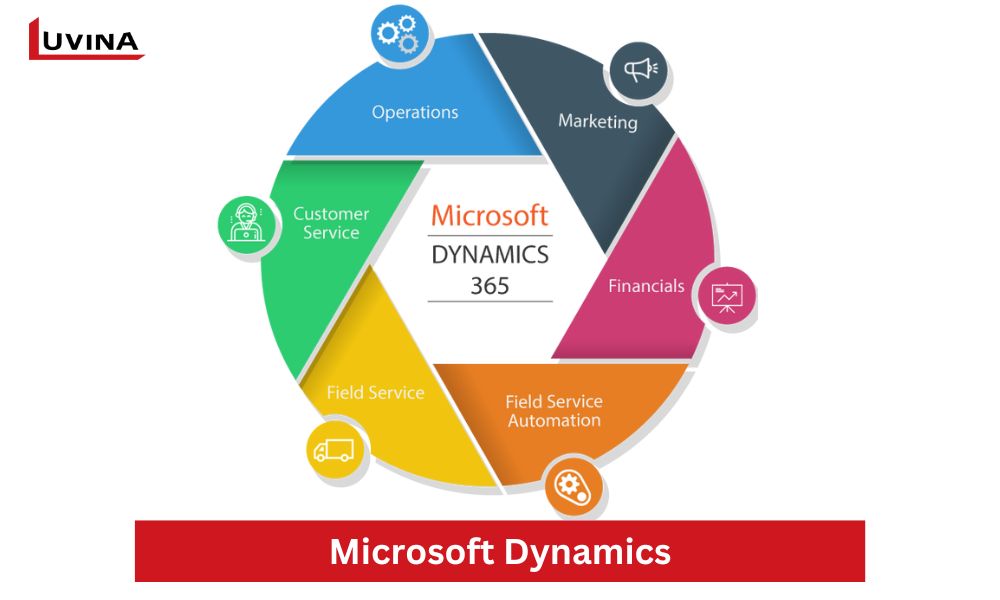
2. SAP
SAP is a platform that meets various business needs and is suitable for many industries such as manufacturing, and services. Currently, the most widely used SAP system is SAP S/4HANA.
3. Netsuite
NetSuite ERP is a cloud-based enterprise resource planning (ERP) system developed by Oracle. This solution enables businesses to manage their finances, accounting, inventory, orders, and operations on a single integrated platform. NetSuite is well-suited for mid-sized to large enterprises, helping them boost efficiency and scale their business operations.
4. Odoo
Odoo is an easily customizable open-source solution with a diverse set of features. This platform includes available applications for managing CRM, PoS, expense reporting, etc. It is particularly suitable for the manufacturing and retail industries.
6. Workday
Introduced in 2006, Workday is a true cloud, SaaS software system for ERP development. This platform helps businesses manage finances, human resources, service automation, project management, etc. Most of Workday’s current customers are medium to large-sized companies and organizations.
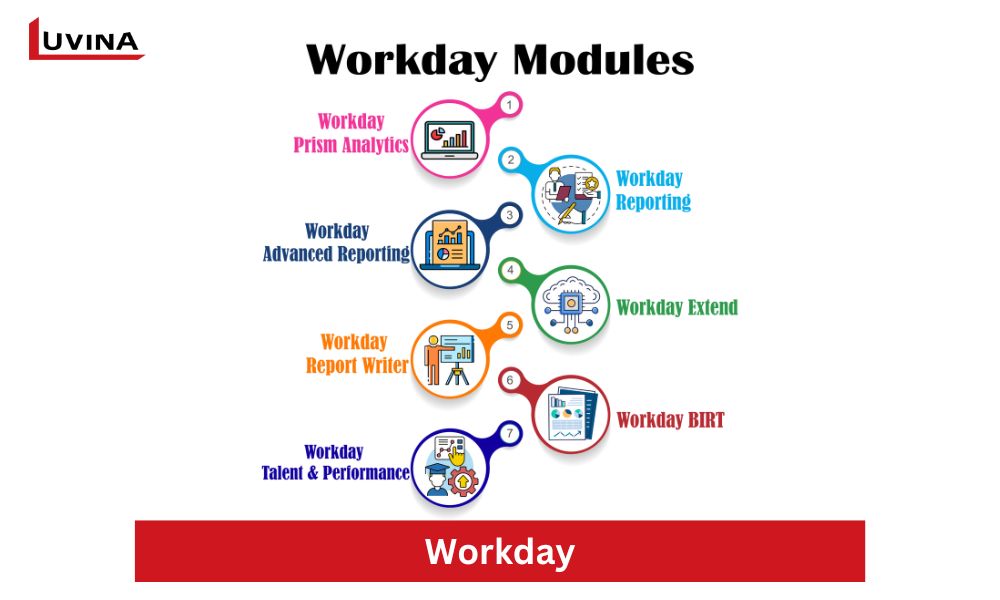
>> Also read: Top 7 Workday Consulting Firms
Custom ERP development: Step by Step
To develop an ERP, each company has a different process. However, fundamentally, the ERP development process generally consists of the following basic steps:
Step 1 – Business Analysis
This is the step of understanding the workflow of an organization to gather requirements for ERP development. This process requires close collaboration among stakeholders to identify the business weaknesses, challenges faced, and the outcomes the business expects from the ERP software.
Step 2 – Design and Planning
In this stage of ERP development, developers will create the architecture and framework (including modules and features) for the ERP system based on the business requirements.

Step 3 – Development and Customization
The development team will start building the ERP system in this step. It involves coding, developing necessary modules, and customizing solutions based on the business requirements.
Step 4: Testing and QA
After completing the ERP software development, the testing phase is implemented to ensure the ERP system functions correctly. Any errors discovered during this stage will be addressed promptly to ensure the system operates accurately and smoothly.
Step 5: Deployment and Training
Following the ERP development, the developers will proceed with software installation, and data migration, and provide user training to familiarize them with the new system.
These are the five basic steps that every ERP development process includes. However, it’s essential to note that ERP development is not a one-time process. Maintenance, support, and improvements will continue even after deployment to adapt promptly to changes in the business and the market.

Conclusions
In developing ERP, whether through in-house development or by outsourcing to development companies, businesses need a profound understanding of this method. Hopefully, with the article above, you have a clearer understanding of ERP system development with its fundamental deployment steps.
If you are seeking an ERP development company for your business, consider collaborating with Luvina. With a team of over 750 experienced IT professionals, Luvina can help businesses build a new ERP system from scratch or customize ERP solutions to comprehensively support business operations. We understand and can work proficiently with popular ERP products such as Microsoft Dynamics 365, SAP, Netsuite Oracle, and Workday.
Partnering with Luvina can give you significant advantages in your business and digital transformation. Learn more about Luvina’s ERP solutions here and contact Luvina now for ERP development to bring long-term success to your business.









Read More From Us?
Sign up for our newsletter
Read More From Us?
Sign up for our newsletter